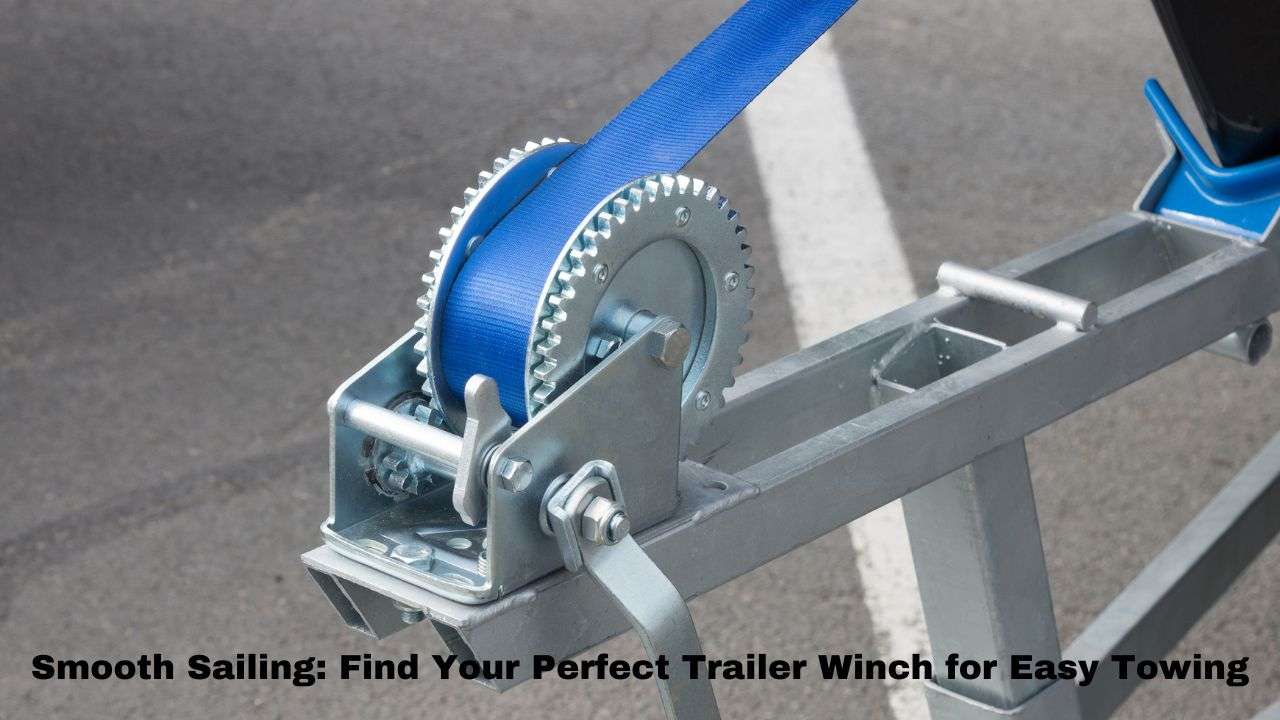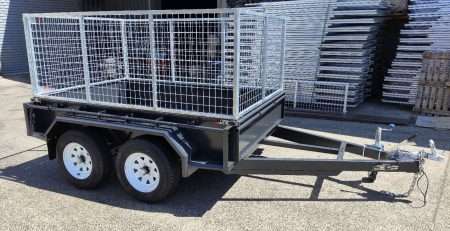
Smooth Sailing: Find Your Perfect Trailer Winch for Easy Towing
Understanding Trailer Winches
When it comes to loading and unloading heavy cargo onto trailers, a trailer winch is an essential component. This tool provides the necessary pulling power to handle heavy loads and ensures a secure loading and unloading process.
The Role of a Trailer Winch
A trailer winch plays a pivotal role in safely loading and unloading cargo onto a trailer. Whether you’re dealing with boats, jet skis, or other hefty loads, a winch is a lifeline for ensuring the job is done safely and efficiently (TrailerTek). Not only does it help in handling heavy loads, but it also reduces the risk of injury by providing a controlled environment for loading and unloading. Companies like PJ Trailers understand this importance and offer reliable and durable winches to meet customers’ needs.

Types of trailer winches
There are different types of trailer winches available, each with their own unique characteristics and advantages. The two main types are manual winches and electric winches (TrailerTek).
Manual winches require physical effort to operate. They are typically operated by a hand crank that winds up a cable or strap, pulling the cargo onto the trailer. These types of winches are generally less expensive and can be highly reliable, but they also require more effort to use.
On the other hand, electric winches are motor-operated and require less physical exertion. With the simple press of a button, the winch motor winds up the cable or strap, pulling the cargo onto the trailer. While electric winches are easier to use, they are generally more expensive and require a power source.
Whether you choose a manual or electric winch will depend on your specific needs, including the weight of the cargo, your budget, and your physical capabilities.
As you familiarize yourself with these tools, it’s also important to consider other towing accessories, such as a trailer brake controller, hitch receiver, or trailer hitch lock, to ensure a safe and smooth towing experience.
Manual Vs. Electric Winches
When it comes to choosing the perfect trailer winch, one of the main decisions to make is whether to go for a manual or an electric winch. Both have their own set of advantages and disadvantages that can make them better suited for certain situations.
Manual Trailer Winches: Pros and Cons
Manual trailer winches require physical effort to operate as they are hand-cranked. This means that they don’t rely on a power source, making them a good option for situations where electricity may not be readily available. According to PJ Trailers, the capacity of manual winches they offer ranges from 1,500 lbs. to 3,800 lbs., allowing for different load requirements.
Here are some pros and cons of manual trailer winches:
| Pros | Cons |
|---|---|
| There is no need for a power source. | Requires physical effort. |
| Generally less expensive | Can be time-consuming for larger loads. |
| Simple to operate | May not be suitable for heavier loads. |
Electric Trailer Winches: Pros and Cons
On the other hand, electric winches operate using a motor and require less physical effort. They are a popular choice for larger trailers or heavier loads, as they can handle higher capacities with ease. Electric winches available for PJ Trailers have a capacity ranging from 2,500 lbs. to 9,000 lbs., offering options for various towing needs.
Here are some pros and cons of electric trailer winches:
| Pros | Cons |
|---|---|
| Requires less physical effort. | Requires a power source. |
| Can handle heavier loads | Can be more expensive. |
| Faster operation | Requires proper wiring for power. |
Whether you choose a manual or an electric winch, it’s important to consider your specific needs and the type of load you will be towing. A manual winch may be fine for a small boat or a personal watercraft, while an electric winch might be more suitable for a larger boat or a car.
Remember, safety should always be your top priority when using a trailer winch. Always use tow straps or chains that are rated for the load you are towing, and never exceed the weight capacity of your winch.
Selecting the Right Winch
Choosing the right trailer winch is crucial for safe and efficient towing. A variety of factors should be taken into consideration, including the weight capacity of the winch and its compatibility with your trailer.
Weight Capacity of Winches
The weight capacity of a trailer winch determines the maximum load it can handle (TrailerTek). It’s crucial to select a winch with a weight capacity that is suitable for the load you plan to haul.
To determine the correct weight capacity for a winch, you should calculate the total weight of your boat, including equipment, fuel, and accessories. After obtaining this figure, multiply it by 1.5 to 2 to estimate the recommended winch capacity. This ensures that the winch is capable of handling the load, even under challenging conditions.
| Type of Load | Load Weight (lbs) | Recommended Winch Capacity (lbs) |
|---|---|---|
| Small Boat | 1000 | 1500 – 2000 |
| Medium Boat | 2500 | 3750 – 5000 |
| Large Boat | 5000 | 7500–10000 |
Please note that these figures are estimates and can vary based on the specific conditions and requirements. It’s always best to consult with a professional or refer to your owner’s manual before making a final decision.
Compatibility with Your Trailer
In addition to weight capacity, compatibility with your trailer is an essential factor when selecting a trailer winch. The dimensions and mounting plate of the winch should match the specifications of your trailer.
You should also consider the gear ratio of the winch. This should be chosen to balance the preferred level of effort with the required pulling power (HC Winches).
When assessing compatibility, it’s also crucial to consider additional trailer components, such as the hitch receiver and trailer wiring harness. These components should integrate seamlessly with your trailer winch for optimal performance.
By carefully considering these factors, you can select a trailer winch that meets your specific needs and ensures safe and efficient towing. Whether you’re hauling a boat with a boat trailer winch or an ATV with an ATV winch, choosing the right winch can make all the difference.
Popular Trailer Winch Brands
When it comes to choosing a reliable trailer winch, two brands that often come to the forefront are PJ Trailers and Dutton-Lainson. Each of these brands offers a variety of winches designed to meet various towing needs.
PJ Trailers Winches
PJ Trailers offers a wide range of trailer winches, both manual and electric, tailored to fit different applications. The brand is known for its commitment to quality and performance, making it a trusted name in the industry.
The manual winches offered by PJ Trailers have a capacity ranging from 1,500 lbs. to 3,800 lbs., allowing for different load requirements. This range provides flexibility to users, ensuring that they can choose a winch that matches their specific towing needs.
On the other hand, the electric winches available from PJ Trailers have a capacity ranging from 2,500 lbs. to 9,000 lbs. These winches offer more power and convenience, making them an ideal choice for heavier loads.
| Type of Winch | Load Capacity (lbs.) |
|---|---|
| Manual | 1,500–3,800 |
| Electric | 2,500 – 9,000 |
For more information on the differences between manual and electric winches, refer to our article on electric winches.
Dutton-Lainson Strong Arm Winches
Another popular choice among trailer users is the Dutton-Lainson StrongArm winch. Known for its robust build and durability, this electric winch is designed to handle demanding towing tasks with ease.
The Dutton-Lainson StrongArm winch is a testament to the brand’s commitment to quality and performance. It offers reliable and efficient operation, making it a go-to choice for many trailer owners.
While specific load capacities for Dutton-Lainson StrongArm winches vary, they are generally known for their power and ability to handle heavier loads effortlessly. Whether you’re towing a boat or an ATV, you can rely on a Dutton-Lainson StrongArm winch to get the job done.
Choosing the right winch brand is crucial to ensuring a smooth and safe towing experience. Whether you opt for a PJ Trailers winch or a Dutton-Lainson StrongArm winch, you can be confident that you’re investing in a product built to last. Remember to consider your specific towing needs and preferences when selecting a winch to ensure that it’s the best fit for you.
Winch maintenance and safety
A trailer winch is an essential tool for safely loading and unloading cargo onto a trailer. Proper use and maintenance of a winch can ensure its longevity and reliable performance. In this section, we will discuss the correct way to use a winch and provide tips for maintaining your winch.
Proper use of a winch
The first step in safely using a winch is understanding its weight capacity, which determines the maximum load the winch can handle. Overloading the winch can result in equipment failure or damage to the cargo.
Before using the winch, ensure that the dimensions and mounting plate of the winch are compatible with the specifications of your trailer (HC Winches).
When using a winch, adhere to the following steps:
- Attach the winch hook to the cargo or vehicle to be loaded onto the trailer.
- Make sure the winch is in the locked position before starting the winching process.
- Slowly release the winch to move the cargo or vehicle onto the trailer.
- Once the cargo is fully loaded and secured, disengage the winch and remove the hook.
Remember, safety is paramount when operating a winch. Always wear gloves to protect your hands, and stand clear of the winch line as it moves.
Maintenance Tips for Longevity
Regular maintenance of your trailer winch can extend its lifespan and ensure smooth operation. Here are some maintenance tips for your winch:
- Regularly inspect the winch for any signs of wear or damage. Pay special attention to the winch cable or strap, as these are often the first parts to show signs of wear.
- Lubricate the winch mechanism regularly to reduce friction and wear. Use a high-quality lubricant suitable for winches.
- Clean the winch after each use to remove any dirt or debris. This can prevent the buildup of grime that can hamper the winch’s operation.
- Store the winch in a dry place to prevent rust and corrosion.
Winches are essential for cargo control, but they should always be used with care and maintained properly. For more information on trailer accessories and their maintenance, check out our articles on trailer brake controllers, trailer hitch locks, and trailer wiring harnesses.
The Future of Trailer Winches
As with many other industries, technological advancements and shifting consumer preferences are likely to shape the future of trailer winches.
Technological Advancements
Technological advancements are already transforming the way trailer winches operate. For instance, electric winches offered by brands like PJ Trailers now come with wireless remote controls, making it convenient to operate the winch from a distance. This feature not only enhances user convenience but also significantly improves safety during cargo loading and unloading.
We can expect to see more innovations in this space in the coming years. These advancements may include more sophisticated control systems, improved durability, and increased load capacity. The integration of smart technologies could also become more prevalent, with features such as remote monitoring, automatic load detection, and predictive maintenance capabilities.
Consumer preferences and trends
Consumer preferences will also play a crucial role in shaping the future of trailer winches. Currently, there is an increasing trend towards electric winches due to their ease of use, reduced physical exertion, and higher load capacities compared to manual winches.
However, the preference between manual and electric winches can depend on various factors, including physical capabilities, convenience, and specific hauling needs (HC Winches). Therefore, manufacturers will need to continue offering a wide range of options to cater to different user needs and preferences.
Furthermore, as consumers become more environmentally conscious, there might be an increased demand for eco-friendly and energy-efficient winches. Manufacturers that are able to innovate and cater to these changing demands will likely thrive in the future.
In conclusion, both technological advancements and shifting consumer trends will influence the future of trailer winches. While it is difficult to predict precisely what the future holds, it is clear that innovations aimed at improving efficiency, safety, and environmental impact will be key drivers in this industry. Stay connected to our blog for more updates on the latest trends and advancements in trailer winch technology.
Author
I am Rahatul Ashiq Tamal. Another author of Muscle Trailers. Muscle Trailers is a well-known trailer brand in Sydney, Melbourne & Adelaide

How to Mount a Spare Tire on Your Trailer: A Simple Step-by-Step Guide
Trailer service centers receive over 1 million phone calls and 1.3 million emails each year about trailer maintenance problems....

How to Fix RV Roof Leaks: Simple Roof Leak Detection Guide for Beginners
Did you know DIY RV roof repairs can cost under $50? But undetected leaks could lead to substantially higher repair...

Starting a Food Truck Business in Australia: From Trailer Selection to Launch
The Australian mobile food market has evolved into a billion-dollar industry. This makes a food truck...
